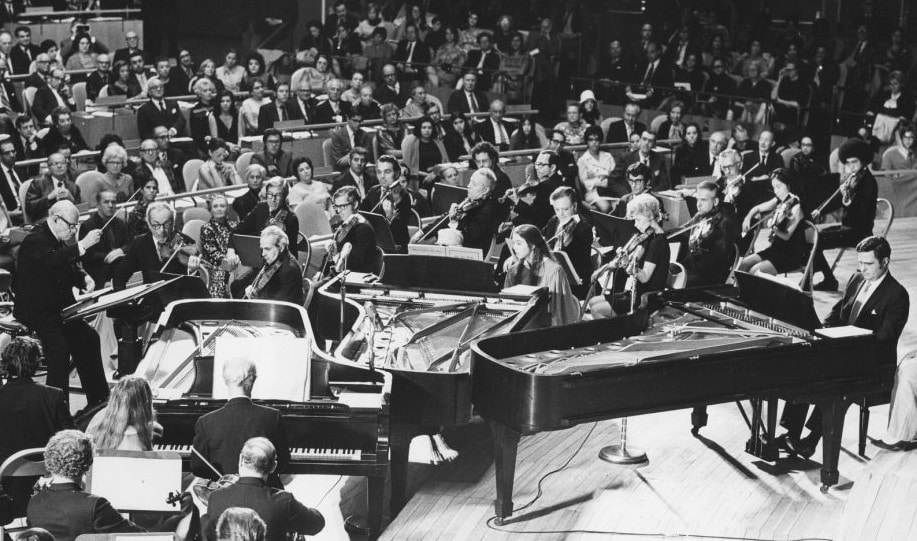Just in: Report calls for ‘equality quotas’ in classical music
mainNew research by Dr Christina Scharff at Kings College London finds extensive inequalities at every level of the classical music profession with regard to sex, class, education and ethnicity.
Among its findings:
– The proportion of women working in the arts and cultural sector has fallen to 43%;
– women earn less than men (£29,015, compared to £34,669)
– only 7% of the cultural workforce was from a black and minority ethnic background;
– just 3.9 % of students at five conservatories were from ‘low participation neighbourhoods’;
– the middle-class culture of music education may explain why classical music continues to appeal to middle-class audiences.
The report recommends ‘The introduction of quotas to increase the representation of minority groups. Quotas can be applied to … commissions, prizes, scholarships, concert programming, conductors and composers.’
Read the full report here. We will be surprised if this recommendation does not become Labour Party policy and an Arts Council condition for obtaining grants.
h/t: John Williamson






Anyone who thinks orchestras (or other arts expressions based on performance in ensemble) can be populated by quotas according to race, “gender,” age or anything else is not fit to write an arts report. If they want to increase the number of students from “low participation areas” — a worthy goal — they have to first get education into those very areas. The solution to ALL these issues is in education across the board, not just in the fee-paying sectors.
Pay, on the other hand, should be based upon position and seniority, not race, gender, age, etc.
Not even Vienna should be driven by the self-defeating nastiness of quotas.
Indeed!
She does not call for quotas in orchestras, but rather blind auditions. She suggests use of quotas in some circumstances for prizes, commissions, scholarships, concert programming, conductors, and composers. All of this is already commonly found in order to bring more inclusion into classical music, something from which the field has benefited.
In some cases it might help orchestras where auditions are not held. Membership in Bayreuth is by invitation from members of each section. The m/f ratio in the winds is about 60 to 2. That’s what happens when the boys don’t hold auditions, much less blind ones. The boys might consider inviting a few more ladies. Ah, I can already hear the howls of protest at such blasphemy…
The comments on SD are a good illustration of how the public for classical music is more conservative than for any other art form (see below.) Note how the 60 to 2 m/f ratio for the winds and percussion in Bayreuth goes without comment, while reactionary attitudes toward the study abound. These attitudes also affect professionals in the field and illustrate the problems women and minorities in classical music still face.
If people from certain ethnic minorities are almost completely absent from the most accessible concerts such as the Proms, what are the chances of finding them represented on the orchestral platform?
Perhaps the interest is simply not there?
If they are never introduced to the existence of classical music, how could they find-out whether they would be interested?
Introduction to Western classical music should be a regular part of any Europeanization process of ethnically-isolated communities, together with the same process for the locals, to cleanse their ears from pop music.
I think you’ve missed the point. Surely the first sign of success of any Europeanisation process (a process which some multiculturalists would probably object to in the first place), would be their appearance at concerts like the Proms. Going from no interest at all (ie: zero interest in concerts) to the Royal College of Music strikes me as an improbably large step.
As far as I’m aware, no special effort has been made to introduce SE Asians to western classical music, but the interest seems to be there naturally.
Oh no. What a load of sheer unadulterated nonsense.
Bullshit…!
What utter nonsense, bosh, rot, poppycock, and figs.
‘Just 3.9 % of students at five conservatories were from ‘low participation neighbourhoods” – if it were more then they wouldn’t be low participation…? Am I missing something.
That aside, I thought people were finally realising that the problem is further down the chain: how can arts organisations be expected to be employ equally when artistic and cultural education in the UK is at a bare minimum, if that. While the government maintains that learning about the arts and culture is a privilege, then working in them will remain just that. It’s disgusting.
Isn’t 7% BME roughly similar to the UK population anyway?
(probably depends exactly on how one defines BME)
No, the BME population of the UK is around 11%
Quotas in the arts. lol…
You don’t really get how the arts work, do you?
For those who decry the U.S. system of arts funding, this is exactly what would happen if government, federal, state and local, became the primary source of funds.
Let’s not forget that 3,5 out of 10 black women from inequal background have great difficulty with the way Mahler symphonies are constructed. Also it appears that 5,7 out of 10 waiters from Pakistani restaurants are allergic to solo cadences. A recent research program carried-out in my own street in Amsterdam showed that only one muslem family lived there and that they were perfectly happy without any knowledge of the existence of western classical music, while the same program revealed the subversive existence of one musician who did not want to cooperate with the inquiries. (I was surprised to find-out that it happened to be me.)
Extraordinary to see the amount of vitriol being directed at an intelligent scholar who has done serious research, and the complacency around classical music’s manifest inequalities. Not pretty.
I would estimate that 90% of readers of this blog would agree with these same assertions and demands in other areas of society. If you promote Marxist values in one sphere of life, don’t be surprised when you find them creeping into your corner…in classical music.
Western civilization has gone from celebrating the individual and their achievements (such as classical music) to reducing everyone and everything to the lowest common denominator: race, class, and gender.
Indeed! We used to extol heroes, now we extol victims.
This is hugely important research. I am very glad that this work is being done.
Suggesting quotas as a solution, however, is not a great idea. This is a good way to get people (such as the commenters on this blog) to shut down completely in terms of openness to the research results and other potential solutions.
The only way any “inclusionary” quota based on anything other than merit can be fulfilled is by excluding others. If you are against discrimination, as I definitely am, then you should be against such quotas. The only kind of quota I can support would be 100% merit-based.
The only way “inclusionary” quotas based on anything other than merit can be fulfilled is by excluding others. If you are against discrimination, as I definitely am, then you should be against such quotas. The only kind of quota I can support would be 100% merit-based only.
The only solution, as highlighted in an earlier post, is education. Successive governments in the UK have failed to provide students with a sufficiently broad education to enable them to approach new ideas with an open and inquisitive mind.
This is interesting, because in my institution we have the opposite situation, with ethnic minorities and even women being represented in our admnistration in far greater numbers than in the general population. I suspect that the institution is rather proud of that fact, but there are serious questions raised as to whether the most qualified candidates were chosen for each of those positions. I am not convinced that that situation benefits anyone.
The vitriol in some comments above really is remarkable. While I am not sure about the wisdom of introducing quotas, some degree of external regulation of the classical music industry is necessary for lots of reasons (not least because the current situation allows for widespread corruption, bullying, abuse and blackmail on the part of those with unchecked powers of patronage). But a more representative classical music world will also only happen when there is sufficient government funding for proper musical education in all schools.
And to those who say that everything should be ‘merit-based’: this is very far from the case at present. The opportunities to become a musician available to those who were born into and frequent the right ‘circles’ vastly exceed those for those who weren’t. Believing that at present musicians get ahead purely in merit is like believing in Santa Claus and the Tooth Fairy,
Well said, Ian – this is an issue we care very much about at Odradek. This is a very well written and researched report, well worth the 10 minutes it takes to read. For those who care about meritocracy, surely whenever there are the large levels of inequality, as this report attests, it is a clear sign that actually things are not happening according to merit, that there are other forces at play.
If we truly care about merit, then cultural institutions have to take these structural biases seriously – blind auditions are the most obvious reform, where they are possible (and they made a big difference in outcomes for orchestral hiring practices). Where not, depending on the institution, quotas should not be ruled out a priori – they can have long term good effects, and expand the talent base, not to mention possibly encourage a more engaged society, something which would help us all.
In the meantime, ANONYMUZE is doing what little part it can to help. If anyone needs a FREE tool for democratically made merit based decision making (essentially blind auditions online), for music, writing, arts – whatever can be evaluated digitally – give us a try. We are still in BETA and building extra functions like user self signup, statistical/analytical reporting to detect bias distortions not present in aggregated application pools’ demographic information, payment gateways for institutions that charge a fee for their applications, cosmetic changes, help desk, and other odds and ends, but the main engine works already. Odradek Records has been using this now for 6 months to evaluate its new artists, and it works great. If anyone wants an account to test or more information, write to x@anonymuze.com, or wait a few weeks when it will be possible to sign up autonomously.
It’s a tool that we offer for free, hoping that it helps make the world a little fairer place.
I hope Dr. Scharff soon turns her attention to the unequal representation of women in occupations such as crab fishing, logging, electrical power-line installation and roofing.
My idea: around 7% of the British population were privately educated. Allowing for a small margin, let’s say that 85-90% of those employed in whatever field of classical music should be drawn from those who were state-educated.
This would lead to a radical shift, perhaps more so than quotas for gender and ethnicity. You could have perfect representation in these categories, but still have near-everyone drawn from the 7%.
I have some sympathy with this. However, I went to a state school but my piano lessons (outside of school) were paid for by my parents so i was partly privately educated. However, euphonium,trumpet and trombone were state funded.The quality of instruments was high, especially the trombone.
At the end of the day, it all boils down to education across the board. Successive governments have done untold damage in the area of musical education and the results are evident in the quotas you mention.